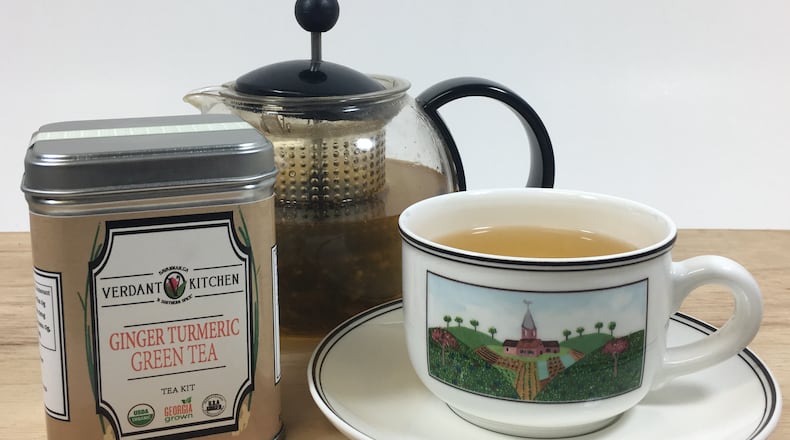"I had a friend say, 'It's very exciting when you start a business and you sell your first bottle. Until you sell your first case. Until you sell your first pallet. Until you sell your first truckload,' " said Ross Harding, co-founder and CEO of Verdant Kitchen. "That's one of the tremendous challenges in building these businesses, how do you effectively scale them up?"
That’s where the founders of Verdant Kitchen, Ross Harding and Howard Morrison, find themselves now. Since 2012 when they first sold one-ounce coffee bags filled with ginger they had grown, harvested, washed, sliced, dried and ground themselves and sold at the Forsyth Farmers Market in Savannah, to today when they’ve grown to offer more than 40 different products from tea to ginger ale to gingersnap cookies sold internationally.
Verdant Kitchen launched with those bags of ground ginger but what moved them from selling a bottle at a time to selling a pallet at a time was a blockbuster combination of ginger syrup and ginger-infused honey.
Credit: C. W. Cameron
Credit: C. W. Cameron
Their Ginger Syrup and Ginger-Infused Honey were part of a gift box set that Oprah was quoted as recommending with, “Get the healthful benefits of ginger in the form of a luscious honey (to stir into tea) or a zingy organic syrup (the possibilities are endless), both made in Georgia.” That publicity gave the company a big push. The 2015 mention by Oprah pushed them to develop a production facility in Norcross.
Harding and partner Howard Morrison started Verdant Kitchen by planting ginger, galangal (sometimes called Thai ginger) and turmeric on what Harding refers to as a “development farm” on Lebanon Plantation, a Morrison family property east of Savannah. They were experimenting to see what would do well in a climate Harding found similar to his native Australia.
“We wanted to look at these plants, I think, a little like people look at grapes. What are the right varieties to grow here? What are their flavor profiles? What conditions do they prefer? We used those first plants to really understand how these crops grow.” And to find the right varieties for the flavors they had in mind. For example, they use their Georgia-grown ginger in their Georgia Ginger Ale because it had the flavors they were looking for in that particular product.
Credit: C. W. Cameron
Credit: C. W. Cameron
They don’t grow all the ginger, turmeric and galangal they use. Harding explains there are some varieties that simply don’t do well here, but still have the flavor profiles Harding and Morrison want for other things they produce.
Harding calls Verdant Kitchen’s offerings “gourmet and wellness products.” A chemist by training, he says he was always interested in what food does in our bodies. He and Morrison were working together on other projects when they began a conversation that would lead to ‘Verdant Kitchen.
“We had other business together that had nothing to do with food. But I talked with Howard and we both saw the potential of developing products that could be both delicious and have a functional benefit.” After years of creating delicious food products that use ginger, galangal and turmeric, they’re now looking into developing supplements.
Credit: C. W. Cameron
Credit: C. W. Cameron
The chemist in Harding is apparent as he talks about the polyphenols and phytochemicals in these rhizomes. But the connoisseur shows up as well, as Harding talks about turmeric as a fabulous spice and how galangal is strikingly delicious and tastes like ginger’s peppery cousin. “What a great thing it is to be a part of finding ways to turn these into products that are enjoyable and useful.”
When offering advice to others wanting to scale their business from farmers market to hundreds of retail outlets, Harding suggests recognizing this is something you cannot do alone. “Georgia in particular has many fine organizations that can help you succeed. The University of Georgia is a tremendous resource as is Gary Black’s team and Georgia Grown over at the department of agriculture. These organizations are staffed with people who have a career’s worth of knowledge to share with you. They help you with information. They help you with connections. We would not have succeeded without their help.”
Credit: C. W. Cameron
Credit: C. W. Cameron
And he reminds those wanting to find a place in the market that it’s full of big players that are well-entrenched. “You have to have something novel and it’s got to be first quality. And you must be prepared to play the long game.”
Check out the AJC Fall Dining Guide 2017: Burning Questions for answers to some of the biggest questions about the metro Atlanta restaurant and drink scene
Read more stories like this by liking Atlanta Restaurant Scene on Facebook, following@ATLDiningNews on Twitter and @ajcdining on Instagram.
About the Author
The Latest
Featured





